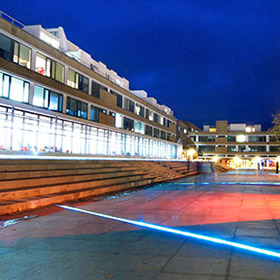Recent Stories
- Businesses urged to tap into science and technology young talent
- Digital relay baton enables remote crowd cheering of athletes
- Health Innovation Campus moves a step closer
- £7.1 million R&D boost for North West businesses
- Centre of excellence created for the next industrial revolution
- Artificial intelligence toolkit spots new child sexual abuse media online
- Strategic partnership set to help plug cyber security skills gap
- What your choice of smartphone says about you
- InfoLabTree: Discover the Story
- novi.digital Launch Event - 'An Event to Help Businesses Grow Online'
RSS Feeds
RSS feeds can deliver the latest InfoLab21 news and events direct to your browser without you having to visit the website.
In most browsers you can click on an RSS link and choose to subscribe to the feed to add it to your favourites or bookmarks.
National Centre for Research and Evidence on Security Threats launched

Lancaster University is to lead the UK’s new centre for the development and use of economic and social science research to understand, mitigate and counter security threats.
The Centre for Research and Evidence on Security Threats (CREST) brings together world leading researchers at the universities of Birmingham, Cranfield, Lancaster, Portsmouth and the West of England to deliver a national hub for independent research, training and knowledge synthesis.
The founding partners will oversee programmes of activity that attract the best social scientists from the UK and abroad to partner with industry and government and break new ground in our understanding of and capacity to counter contemporary threats.
Launching today (October 1), the Centre was commissioned by and will be administered by the Economic and Social Research Council (ESRC) with a focus on conducting independent research and knowledge synthesis to inform approaches to countering contemporary security threats to individuals, communities and institutions.
The centre is funded for three years with £4.35 million from the UK security and intelligence agencies and a further £2.2m invested by the founding institutions.
Director of CREST Professor Paul Taylor, from Lancaster University, said: “Bringing together the UK’s top economic, behavioural and social scientists with partners in industry and government will provide unprecedented opportunities to develop our understanding of security threats and how best to mitigate them.
“Today’s threats are challenging and diverse. The ambitious and innovative activities of CREST over the coming years will meet these challenges."
As well as conducting world-class, independent research, the Centre will stimulate public and professional debate, connect disciplinary communities, inform security policy and practice, and provide training to research leaders of the future.
Lancaster University will lead the research programme on ideas, beliefs and values in social contexts, examining how extremist ideologies are transmitted and countered.
The other founding partners will lead programmes looking at actors and narratives, online behaviour, eliciting information, and protective security and risk assessment.
The project will initially fund 13 PhD students working across all five universities.
Fri 23 October 2015



